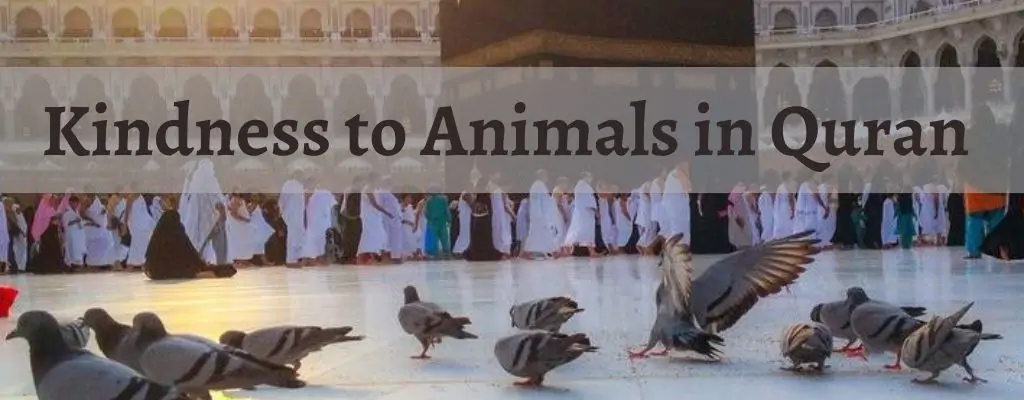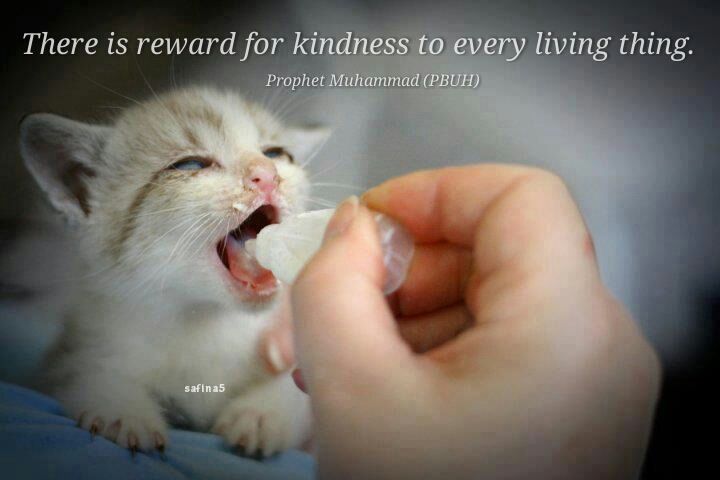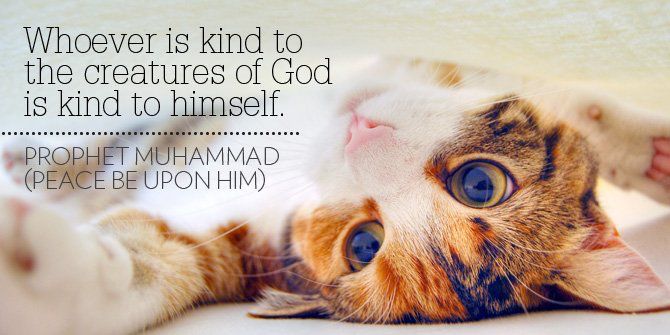Introduction:
Kindness to animals in Islam extends far beyond human interaction — it encompasses all of creation, including animals. The Qur’an highlights compassion, responsibility, and gentle treatment toward every living creature. From birds in the sky to cattle in the fields, animals are seen as communities like us, deserving of respect and care.
This article explores how the Holy Qur’an speaks about animals, their role in the natural world, and the responsibility Muslims have to treat them with mercy. Whether you’re a student of Islamic ethics or simply someone who cares about animals, you’ll find deep inspiration in the verses that honor the rights and dignity of all living beings.
All Creatures Are Nations (Quran 6:38):
The verse “And there is not a moving creature on earth or bird that flies with its two wings except they are communities like you” reveals through it that animals make nations or communities of their own, just as the humans do. Arabic: وَمَا مِن دَآبَّةٍۢ فِى ٱلْأَرْضِ وَلَا طَـٰٓئِرٍۢ
Transliteration: Wa mā min dābbatin fī l-arḍi walā ṭā’irin yaṭīru bijanāḥayhi illā umamun amthālukum. This verse in this Surah focuses on the idea that animals have ways to live, social schemes, and inherent values. This surah encourages man’s reverence for the animal world as part of Allah’s greater creation.
All Creatures Are From the Same Essence: Quran 24:45
The verse states that everything that lives is from one origin and is related to it; all have the same origin. “And Allah has created from water every living creature: Some of them crawl on their bellies, some walk on two legs, and some walk on four. Allah creates whatever He wills. Surely Allah is Most Capable of everything.”. Arabic: وَٱللَّهُ خَلَقَ كُلَّ دَآبَّةٍۢ مِّن مَّآءٍۢ ۖ فَمِنْهُم مَّن يَمْشِى عَلَىٰ بَطْنِهِۦ وَمِنْهُم مَّن يَمْشِى عَلَىٰ رِجْلَيْنِ وَمِنْهُم مَّن يَمْشِى عَلَىٰٓ أَرْبَعٍۢ ۚ يَخْلُقُ ٱللَّهُ مَا يَشَآءُ ۚ إِنَّ ٱللَّهَ عَلَىٰ كُلِّ شَىْءٍۢ قَدِيرٌۭ
Transliteration: Wa Llāhu khalaqa kulla dābbatin min mā’in fa-minhum man yamshī ʿalā baṭnihi wa-minhum man yamshī ʿalā rijlayni wa-minhum man yamshī ʿalā arbaʿ. Yakhluqu Llāhu mā yashā’. ‘Inna Llāha ‘alā kulli shay’in qadīr. This verse from Surah An-Nur highlights species variation and their creation from a common element.
Besides these Holy Quranic verses, there are hundreds of other Hadiths, which place even greater emphasis on good treatments of animals. For instance, Prophet Muhammad is reported to have said: “Whoever is kind to the creatures of God is kind to himself” (Bukhari and Muslim).
The Islamic view of life is holistic and Mercy of Allah extends to whole creation. This helps a Muslim develop a sense of responsibility towards animals and environment and to recognize their worth and their right.
Animals Also Glorify Allah

While the word of Allah, the Qur’an, and sayings and deeds of Prophet Muhammad, peace and blessings be upon him, the Sunnah, both emphasize that animals also worship Allah. Allah declares in the Qur’an:
“Do you not see that Allah is exalted by whomever is within the heavens and the earth and [by] the birds with wings spread [in flight]? Each [of them] has known his [means of] prayer and exalting [Him], and Allah is Knowing of what they do.”
Both Humans and Animals Will Be Judged on the Day of Judgment
Humans are answerable for their deeds before God at the time of Judgment. Non-human creatures are also judged but on a minor scale, as they do not have free will. After being judged, they are turned into dust and their lives come to an end.
Abu Huraira reported Allah’s Messenger (PBUH) as saying:
“The claimants will get their claims on the Day of Resurrection, so much so that the hornless sheep will get its claim from the horned sheep.”
[Sahih Muslim]
Even though animals are not accountable as human beings and jinn are, all of God’s creatures submit to Him.
- Prophet Muhammad’s Love for Animals
Prophet Muhammad (PBUH) demonstrated a lot of love for and compassion toward animals. Islam praises and emphasizes having mercy on animals, while cruel treatment toward them is firmly prohibited. These include forbidding cutting off an animal’s mane or tail, torturing it, neglecting it, sport hunting, and abusing the animal.
Narrated Abu Huraira: The Prophet said:
“Do not use the backs of your animals as chairs. Allah has made them subject to you so that by them you can reach places that you would not otherwise be able to reach except with great fatigue.”
[Sunan Abi Dawud]
The Messenger of Allah (PBUH) also said:
“If a person is kind to an animal, is the reward the same as if he were kind to a human being? And if a person is cruel to the animal, is the cruelty the same as if he were cruel to a human being?” The Prophet replied, “A good deed done to an animal is like a good deed done to a human being, while an act of cruelty to an animal is as bad as cruelty to a human being. Fear Allah in these beasts which cannot
“O Allah’s Messenger! Is there a reward for us in serving the animals?” He replied: “There is a reward for serving any living being.”
[Sahih al-Bukhari]
Mercy as the Basis of Relationship Between Humans and Animals
Man has been created by Allah, the Omnipotent, to be the custodian and guardian of the Earth and for all other creatures to be subjugated to them. In Islam, the rules of conduct have been strictly based on mercy, enjoining good, and forbidding evil toward every human and nonhuman creature. For example, in Islam, killing animals without need—for instance, for fun or sport—is forbidden.
So, in cases of killing for food, Islamic slaughtering has special manners characterized by “Ihsan” (performing acts perfectly according to divine guidance).
Abu Ya’la Shaddad bin Aws reported that the Messenger of Allah (PBUH) said: .END
“Allah has enjoined Ihsan in all things. If you kill, kill well and if you slaughter, slaughter well. Let one of you sharpen the edge of his knife to reduce the pain.
“Ihsan” at the time of slaughter means to minimize the suffering of the animal because one is taking life only by the permission of Allah to meet the needs of food.
- Names of Animals Mentioned in the Quran
It is most fascinating to note that various animals, birds, and even some insects have been mentioned in the Qur’an—about 27 species. These are:
Cow, Camel, Horse, Mule, Dog, Pig, Donkey, Monkey, Ewe, Lion, Sheep, Goat, Wolf, Calf, Elephant, Whale, Birds, Crow, Hoopoe, Swallow, Quail, Frog, Snake, Worm, Ant, Honeybee, Butterfly, Spider, Lice, Mosquito, and Locust.
All of these creatures are referred to in the Holy Book as creations of Allah, worshipping Him and performing their task by instinct.
Surahs Named After Animals
Some of the chapters of the Qur’an are named after animals and insects; these provide information regarding their nature, habits, and incidents. Examples are: Al-Baqarah (The Cow), An-Naml (The Ant), Al-‘Ankabut, The Spider, Al-Fil, The Elephant, and An-Nahl, The Bee. Rules of Slaughtering Animals in Islam The blade to be used for slaughtering must not be sharpened in the sight of the animal that is to be killed so as to minimize pain. The knife-blade should be free from blemishes that might tear the wound.
The animal must be in a rested position whereby it is comfortable to be slaughtered.
The slaughterer must pronounce the name of God.
The animal must die through slitting of the throat with a sharp knife in one action of back-and-forth movement.
The slaughterer must ensure the cutting of, at least, the three in the trachea and oesophagus, the two blood vessels in the neck.
The spinal cord must not be cut.
The animal must also not have a look at other animals being slaughtered.
The animal must be allowed to bleed out.
Harmony in the world is the divine will of Allah and it is only disrupted by human misbehavior straying from the righteous path revealed to Prophet Muhammad in the last divine message of God to humanity, “The Quran.”
How to Treat Animals

It is transparently evident from the teachings and practices of Prophet Muhammad that causing pain and misery to helpless creatures is strictly prohibited, and we will have to give an account to Allah the Almighty for our such doings. The Prophet said,
“Whoever kills a sparrow or anything bigger without ‘just cause,’ Allah holds him accountable on the Day of Judgment.”
The people asked, “What is a just cause, O Messenger of Allah?”
He said, “That he kill it for food, not merely cutting off its head and then leaving it.” (An-Nasa’i)
Indeed, Islam wants humankind to respect and treat all creatures, even birds, sea animals, and insects, in a dignified manner. The ways of showing mercy to these creatures have been repeatedly described by Prophet Muhammad.
He forbade the clipping of the hair on the tails and manes of horses, cutting animals in sensitive areas, and leaving horses saddled without a reason (Muslim). If the Prophet came across any animal that had been over-loaded or underfed, he would speak softly to the owner and say, “Fear Allah in your treatment of animals.” (Abu Dawud)
Condemnation of Cruelty
In pre-Islamic times, acts of torture and cruel treatment to animals were part of pagan superstition and practice of polytheism. Islam condemned such acts and put an end to all such practices.
When Prophet Muhammad and his Companions migrated to Madinah, they found that the people of that city had the practice of cutting off the humps of camels and the fat tails of sheep in order to eat them. The Prophet disallowed them from doing so and said,
“Whatever is cut off an animal while it is still alive, is carrion.” At-Tirmidhi
The protection of animals from pain and undue suffering is paramount in Islam. Rules with respect to the slaughtering of animals are very strict.
“Allah has ordained kindness (and excellence) in everything. If the killing (of animals) is to be done, do it in the best manner, and when you slaughter, do it in the best manner, sharpen the knife and put the animal at ease.” (Muslim)
Humankind needs to find a balance in how they treat animals. All creatures on the earth were put here by Allah for our use. They are not on par with humans but are not to be treated harshly either.
It is the responsibility and destiny of humanity to provide animals with food to eat, a supply of water to drink, and protection from wind or weather. Creatures are not to be overburdened, mishandled, or intentionally tortured, and he who does will surely incur Allah’s wrathful justice.
A believer in Allah believes that all creation is worthy of respect and awe. The personality and behavior of Prophet Muhammad illustrate strikingly how respect for all that exists is to be carried out.
Care for Animal’s Emotions: Diffusing Civil War in Madinah
While avoiding physical cruelty is necessary, never to forget the protection from mental cruelty.
Emotional stress of even a bird counts. A Companion of Prophet Muhammad has narrated an incident:
“We were traveling, and in the absence of the Prophet, we saw a bird with its two chicks. We took them. The mother bird was circling in the air flapping its wings out of sorrow.
When the Messenger of Allah came back, he asked, ‘Who has grieved this bird by taking its chicks? Return them to her.’ ” (Narrated by Abu Dawud and declared authentic by Al-Albani)
The incident epitomizes the compassion and care that Prophet Muhammad had toward the emotional well-being of every living creature, however small. His actions in this regard were telling on the path to treatments of animals with gentleness and respect not only bodily but also to be thoughtful about their psychic condition.
Conclusion
What Allah Teaches Us About Animals
All creatures are citizens and are nations and communities just like men, each having their own nature, urge, order, laws, and language. All of them have their forms of greater and glorification of Allah Almighty—prayer, prostration, praise, and exaltation, even if man does not understand. Subjection to man does not sanction any cruelty towards them.

AoA, my name is Abd al-Rahman, and my vision is to spread the knowledge of the Quran to everyone. I am proud and tall while standing as your trusted mentor on the journey of learning and memorizing the Holy Quran. I, along with a committed team of Islamic teachers, am bound to provide an easy online facility for Islamic studies and Hifz programs.

